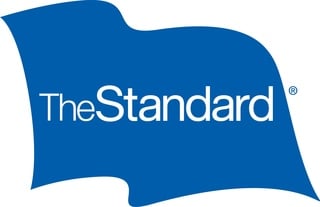5 Best Group Disability Insurance
As companies aim to recruit and retain top talent in a competitive job market, it may be time to revisit and make adjustments to your benefits package. Offering short- and long-term disability plans can be an excellent way to stand out as an employer.
According to the EY 2023 Workforce Benefits Study, disability coverage is in the top 10 of desired employee benefits, outpacing tuition assistance, student loan repayment and caregiving benefits.
To help you decide which insurer to work with, we evaluated leading insurance companies and identified the five best group disability insurance companies based on their products, riders, customer service and financial stability. Read on for more.
Our Top Picks for Best Group Disability Insurance
- Best Overall: Guardian
- Best for Online Enrollment and Access: Breeze
- Best for Personalized Support: Mutual of Omaha
- Best for Comprehensive Benefits: The Standard
- Best for Small Business Owners: Principal Financial
Best Group Disability Insurance Reviews
- Offers additional group benefits
- Optional riders available
- Multiple payment options
- No online quotes available
- Riders not available in all states
- Short-term disability benefits capped at 60% of gross salary
Why We Chose It: Guardian offers both group short-term and long-term disability insurance policies to businesses with two or more employees. The insurer offers a high level of customization, allowing employers to adjust their plans to fit their budgets and employees' needs.
For example, with Guardian Disability Income Select, a voluntary short-term disability income insurance, employers can choose a benefit amount of $50 to $2,500 per week, up to a maximum of 60% of the employee's gross salary. Employers can decide to offer the benefits for as little as four weeks or as long as two years.
Guardian also has a long-standing reputation for customer service; most short-term disability claims are processed within eight days or less.
Unfortunately, Guardian doesn't offer online quotes, and there is limited information about its plans and available riders online. To get detailed information about cost and coverage, you need to work with a Guardian group insurance sales representative.
- Portable coverage
- Quick set-up process
- Multiple payment options
- Limited benefit payouts
- Limited benefit duration
- Relatively new company
Why We Chose It: Breeze is a newcomer to the disability insurance industry; it was only launched in 2019. The company aims to simplify and streamline the process of getting disability insurance, boasting an entirely digital enrollment process for employees.
Because of Breeze's digital focus, employers can set up coverage and have employees enroll online quickly. Breeze doesn't require medical exams or phone interviews, so employees can sign up in a matter of minutes.
As an employer, Breeze lets you decide how you want to handle coverage payments; you can fully pay for employees' short-term disability insurance, cover a portion of their benefits or make it completely the employee's responsibility — whichever fits your budget.
However, Breeze's benefit maximums are stricter than other companies' limits. Its plans can pay up to $1,500 per week for up to 26 weeks.
Additionally, Breeze is a young company, so it doesn't have the track record of other companies that have been in operation for decades. And, Breeze isn't an insurer. Instead, it acts as an insurance agency selling policies. All of the disability policies sold through Breeze are issued by the Principal Life Insurance Company.
- Offers on-site meetings
- Bilingual enrollment representatives
- Added benefits and services available
- Benefit amount capped at 60%
- Must work with a local sales representative
- Limited plan details online
Why We Chose It: If you run a larger business, Mutual of Omaha may be an excellent choice. It issues both short- and long-term disability policies, and it makes enrollment easy with pre-enrollment communication materials, on-site group meetings to provide information about the plan options and bilingual enrollment representatives.
Mutual of Omaha offers additional services, such as employee assistance programs and travel assistance, to boost employee productivity and to ensure smooth operations when key workers are out on leave.
However, Mutual of Omaha provides little information about its policies online, and you must work with a local sales representative to find out more about available options. While most companies require you to speak with an insurance agent, Mutual of Omaha's website is more barebones than most.
- Higher monthly benefit limit (70%)
- Robust online tools
- Other employer benefits
- Coverage and support vary by state
- Restrictions on some services based on company size
Why We Chose It: The Standard is a leading insurer offering a suite of insurance products, and its workplace solutions segment allows employers to provide disability, life, dental, vision, accident, and paid family and medical leave to their workers.
The Standard's disability policies have higher-than-usual benefit caps; its policies can replace up to 70% of an employee's earnings, up to a monthly maximum benefit of $25,000. It has extensive online tools you can use to manage your workplace benefits, and companies of 250 or more — with at least 50 employees at a specific location — can have educational on-site meetings led by insurance representatives.
Coverage amounts and added benefits vary by state, and some restrictions on company size apply. For example, employee assistance programs are only available to companies with 10 to 2,499 covered employees. And the lifetime security benefit — which extends the maximum benefit period for long-term disability coverage — isn't available in California.
- Low employee count minimum
- Multiple insurance options
- Administrative services available
- Some services aren't available in all states
- No online quotes
Why We Chose It: If you own a smaller business with less than 10 employees, finding a company that will work with you to issue group disability insurance can be difficult. But with Principal, you can get coverage with as few as three covered employees, making it a good choice for microbusinesses and startups.
Principal sells both short- and long-term group disability insurance, and it issues other forms of coverage, including life insurance, dental insurance and even retirement plans.
As a small business owner, you may not have the time or staff available to handle the administrative tasks associated with adding disability insurance to your benefits package. With Principal, you can take advantage of its optional insurance services, and Principal will handle educating your employees about policy options, enrolling workers and administering benefits.
Unfortunately, Principal doesn't allow customers to get quotes for group policies online, and some of its services aren't available in all states.
Other companies we considered
In addition to our selections listed above, we considered the following companies:
Assurity
Although Assurity is a well-known insurance company, it only sells short-term group disabilities policies; employers interested in long-term coverage will have to look elsewhere. And it doesn't sell its policies to residents of New York, so companies in that state aren't eligible.
Unum
Unum sells short- and long-term group disability plans, but the maximum benefit amount is 60% of the employee's pay; higher amounts are limited to individual plans. Its services and policies aren't available in all states.
Group Disability Insurance Guide
Few Americans have enough money saved to cover their bills if they're injured and can't work. Yet the U.S. Bureau of Labor Statistics reported that just 41% of private, non-union workers had access to short-term disability plans in 2023, and just 35% had access to long-term disability.
As an employer, group disability insurance provides protection and peace of mind to your workers, but it's important to understand how these policies work.
What is group disability insurance?
Group disability insurance is generally offered by employers who work with an insurance company to provide disability coverage to their employees. It provides income protection for the employee in the event of a qualifying disability (think an accident, injury or a chronic or critical illness).
This arrangement often allows employees to access coverage at a lower cost compared to purchasing disability insurance on their own. The cost reduction is generally a result of the group's collective purchasing power or the employer's partial or complete subsidy of monthly premium expenses.
There are two types of disability insurance:
- Short-term disability coverage: Short-term policies have waiting or elimination periods — the time before the policy kicks in — of zero to 14 days. The maximum benefit period can be a few weeks or as long as two years.
- Long-term disability coverage: Long-term policies often have waiting periods of several weeks or months, and can provide benefits for several years, up until retirement age or for the remainder of the policyholder's life.
How does group disability insurance work?
When you offer group disability coverage to your workers, your employees receive a percentage of their salary — up to a monthly cap — if they become disabled and are unable to work for a period of time.
Depending on the policy, there may be a waiting period before benefits begin. Benefits end when the employee returns to work or when the coverage period ends. Typically, policies cover about 50% to 60% of the employee's earnings.
Group disability insurance plans are highly customizable, allowing employers to choose how much they want to contribute to their employees' plans as well as the plan's coverage limits and benefit duration.
Employers can also choose whether to include optional benefits like residual disability coverage, which pays partial benefits if the employee can no longer work full-time or at full capacity, and determine the plan's definition of disability.
For example, plans may be structured in one of two ways:
- Own occupation policies: The policy will pay benefits if the employee is unable to perform their specific job before becoming disabled.
- Any occupation policies: The policy will pay benefits if the employee is unable to perform any job they may be qualified to perform based on their experience and education.
Group disability insurance cost
Employers usually cover some or all of the cost of group disability coverage. According to Evan Tunis, president of Florida Healthcare Insurance, costs are dependent on the size of the company and industry type.
"Industry type can also play a role in the cost of group disability insurance," he says. "For example, industries with higher levels of physical labor or hazardous work may have higher rates as there is a greater risk of employees becoming disabled and needing to make claims."
However, there are some advantages to offering group disability insurance. "Employers may be able to receive tax deductions for the premiums they pay towards group disability insurance coverage for their employees," says Tunis. "This can provide cost savings for the company."
Group disability insurance vs. individual policies
When deciding between group disability coverage and individual disability insurance, there are some key factors to consider:
- Payment responsibility: With group policies, the employer can decide to cover some, all or none of the cost. With individual policies, the covered person is solely responsible for the insurance premiums. In general, group policies tend to be less expensive overall than individual policies.
- Underwriting: Group policies typically don't require medical exams for standard coverage limits. But for individual policies, medical exams and phone interviews are likely to be part of the underwriting process.
- Coverage maximums: Benefit maximums tend to be lower for group policies than individual disability insurance, so some people opt to supplement their group disability policies with individual policies.
- Portability: Group disability insurance isn't always portable, so the employee may lose their coverage if they are let go or resign. With individual policies, coverage isn't tied to employment, so the employee keeps their coverage if they leave the company.
How to file a claim for group disability insurance
If an employee is covered by group disability insurance and needs to file a claim, the U.S. Department of Labor recommends they:
1. Notify the employer and the insurance provider of the situation.
2. Get the necessary forms from the benefits administrator.
3. Include medical records and their doctor's information on the claim form.
The employer will also need to complete a portion of the form, detailing what the employee's job responsibilities are, what tasks they are unable to do because of their injury or illness and their income at the time of the disability.
Group Disability Insurance FAQs
As a business owner, am I required to offer group disability insurance?
These include: California, Hawaii, New Jersey, New York, Rhode Island, and Puerto Rico.
Who pays for long-term disability?
How many employees must be enrolled in a group disability insurance?
Is group disability income taxable?
Are employer-sponsored group disability insurance benefits considered earned income?
Can employer long-term group disability insurance be reduced if I have other income?
Methodology
To identify the best disability insurance companies, we evaluated the insurers listed on the National Association of Insurance Commissioners' (NAIC) list of top writers of life and fraternal insurers as a starting point.
Each company was evaluated on the following factors:
- The company's financial strength ratings according to AM Best
- The insurer's complaint ratio as reported by the NAIC
- The company's insurance options, benefit maximums, payout duration, available riders and elimination periods
- Availability of online shopping tools
- Number of states in which the company is licensed to operate
Insurer details, product information and coverage options can change, so we recommend contacting the disability insurance provider directly for the most up-to-date information.









